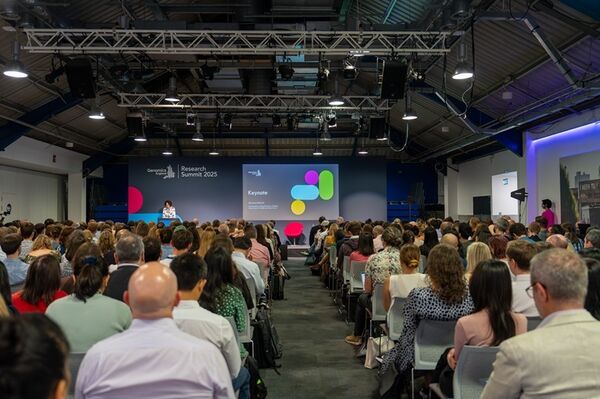Genomics England Research Summit: Revolutionising health through genomics

Genomics England’s 2025 Research Summit welcomed a captivated audience to hear about the latest research and technological innovations from Genomics England, participants, its esteemed research community and members of the wider genomic research and healthcare community.
The rapid growth of genomics’ capabilities over the past decades shows no signs of slowing down, with genomic technologies and their implementation within routine healthcare continuing to transform patients’ lives and improve the health of the population. Further advances in genomic testing and therapies, combined with the potential to leverage data with AI, are opening a range of opportunities to make healthcare more preventative, boost research, and drive better health outcomes.
This year’s programme covered some of the most exciting advances in rare conditions and cancer diagnosis, pharmacogenomics, emerging technologies, and new treatments. Attendees were given a glimpse into what the future of genomic research and medicine may hold, as well as the groundbreaking work happening today.
The event provided valuable networking opportunities and featured talks, panel discussions, posters and exhibitions from some of the world’s most prominent figures across genomic research, government, industry and the NHS, in addition to patients and participants in genomic research.
Some of the topics from this year’s talks included:
- The Generation Study. Speakers from Genomics England, Manchester University NHS Foundation Trust, Great Ormond Street Hospital, and GenePeople discussed their experiences of the Generation Study and returning results to families. The Generation Study – led by Genomics England in partnership with NHS England - is using whole genome sequencing to look for more than 200 rare conditions in newborns that can be hard to diagnose and for which NHS treatment is available.
- ReNU syndrome. One year on from researchers using data from the National Genomic Research Library to discover a remarkably prevalent neurodevelopmental disorder, this talk outlined the impact diagnoses are having for families and the progress made both by researchers and families themselves.
- The GenROC study. A team of researchers at the University of Bristol hope to improve our understanding of how rare genetic syndromes affect the way children grow, their physical health and their development. This presentation shared the team’s learning of patient and public involvement’s importance, barriers and obstacles to rare conditions research, and successful solutions.
- Advances in understanding 100,000 Genomes Project data and implications for future clinical trials. The 100,000 Genomes Project has enabled new understanding of mutational signatures within cancer – or the ‘molecular footprint’ of a tumour. This new knowledge combined with existing data could transform the speed and scale of clinical trials, to accelerate getting the right drugs to the right patients at the right time.
“Our Research Summit is always a key moment in the year, helping to accelerate the future we see ahead of us and showing how the world is being changed through collective effort.
“A personal highlight was the talks given by participants who did such a fantastic job of bringing things back to the need for change and the need to do more for those affected by rare conditions and cancer.
“It’s an exciting time. This idea that genomics could be a routine component of healthcare in an increasingly prevention-focused healthcare system is no longer something we simply talk about, but a reality that we can see a path to in the UK. I look forward to seeing everyone next year for another reminder of the UK’s position as the best place to discover, prove, and benefit from genomic innovations.”
Dr Rich Scott
Chief Executive Officer of Genomics England


